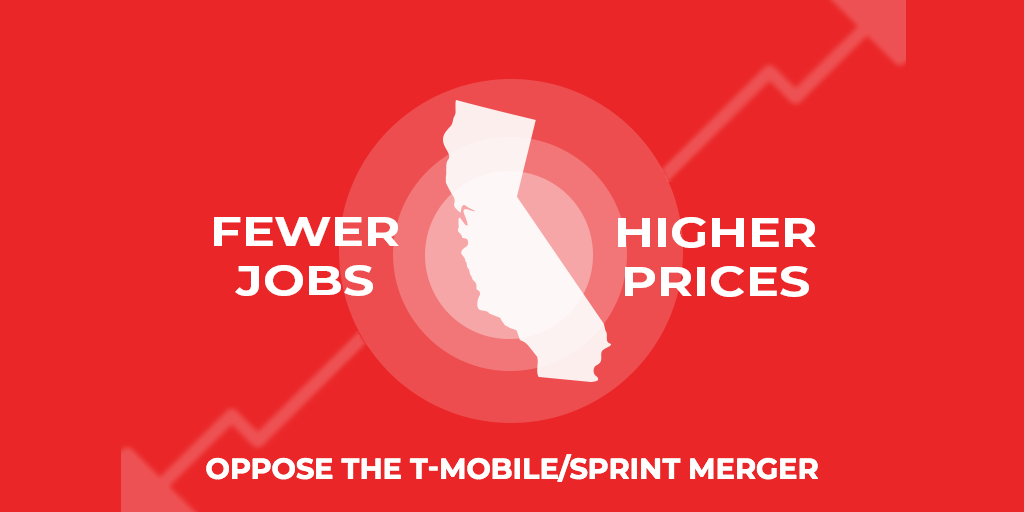New Brief Details Why Sprint is Well-Situated to Compete as Standalone Company; Shows that T-Mobile’s Jobs Pledge is Wholly Insufficient; and Provides Evidence that T-Mobile is Backtracking on Its Rural Commitment
Washington, D.C. - In a reply brief filed on Friday with the California Public Utilities Commission (CPUC), Communications Workers of America (CWA) District 9 demonstrates that the proposed T-Mobile/Sprint merger is “not in the public interest and cannot lawfully be approved as structured” and calls on the CPUC to “deny the proposed merger as currently structured.” The brief notes that the merger would:
“[E]liminate more than 3,000 California jobs, increase wireless employers’ power to unilaterally set wages and combine two companies with a long history of labor and employment violations. The proposed merger also raises serious competitive concerns that would disproportionately impact low- and moderate-income customers.
[M]oreover, the Applicants have failed to provide evidence of verifiable, merger-specific public interest benefits. The record shows that both companies are already poised to roll out 5G services and both companies would continue to compete as standalone companies. The record also does not support the applicants’ claim that the merger would bring vastly improved service to rural California.”
Among the new and significant components of the brief are the following:
Sprint is well-situated to compete as a standalone company.
As the brief notes, “T-Mobile and Sprint paint a bleak picture of their prospects (especially Sprint’s) as standalone companies. The Applicants argue that, absent the merger, T-Mobile could not “add significant quantities of consumers” and Sprint’s “ability to invest in its business will be challenged.” The reality – including financial reports from after the filing of the merger application and statements by the companies’ executives – is quite different. Evidence shows that both companies are well-situated to compete as standalone companies.”
The brief includes the example of the February 2019 sworn testimony of Sprint COO Brandon “Dow” Draper at the CPUC evidentiary hearing. Mr. Draper testified that “there’s nothing in my rebuttal testimony, again, that says Sprint is going out of business, that Sprint is not going to build a 5G network that Sprint is not going to be a competitor in the future.” When asked whether he agreed with a Bloomberg News report that Sprint’s 2018 fiscal third quarter results “help allay concerns that the carrier is doomed if it can’t complete its proposed merger with T-Mobile,” Mr. Draper responded, “Yes.” After being pressed further regarding Sprint’s claimed (but unsupported) doom and gloom, Mr. Draper confirmed that, on a standalone basis, Sprint “will be a competitor. Sprint will launch 5G.” Finally, when asked whether Sprint will survive on a standalone basis? Mr. Draper replied “Absolutely.”
T-Mobile’s jobs commitment is wholly insufficient because it does not cover retail workers employed by independent authorized dealers - which comprise more than 83% of T-Mobile stores.
As the brief explains in detail, T-Mobile’s jobs commitment, pledging “no net job losses in California,” is disingenuous (at best), if not willfully misleading. That’s because T-Mobile’s jobs commitment would apply to none of the employees at authorized dealer stores, which comprise more than 83% of all T-Mobile stores. Detailed economic analysis by CWA shows that 28% of duplicative T-Mobile and Sprint stores in California would close from the merger, eliminating approximately 3,342 California jobs.
T-Mobile is backtracking on its rural commitment, reducing its 5G commitment to 90% of cell sites in its engineering plan for California and pushing back the timetable to reach this lower benchmark by one year.
A recent memorandum of understanding (MOU) regarding the proposed merger between the companies and the California Emerging Technology Fund states, “[w]ithin six years of the Transaction close date” New T-Mobile would deploy 5G technology “at 90% of the cell site locations in its network plan for California.” The MOU is “a step backwards,” reducing post-merger 5G service to 90% of cell sites in its original plan and delaying reaching even that lower benchmark by one year. As the brief notes, the “MOU’s 10% reduction in the number of upgraded sites would result in post-merger service in rural areas that is inferior to the service described in the Applicants’ testimony.”
To illustrate this point, the brief highlights an example of Humboldt County. If a single cell site in the southeastern part of the county were part of the 10% not upgraded, “almost all of the projected 5G mid-band enhancement proposed in the county from 2021 to 2024 would be left out.”
The full CWA District 9 brief is available online here and includes detailed analysis and arguments exploring the following topics:
- The merger is not in the public interest;
- The merger would eliminate thousands of California jobs;
- The merger would combine two companies with a long history of labor and employment violations;
- The merger would increase wireless employers’ power to unilaterally set wages;
- The merger would adversely affect competition, disproportionately impacting low- and moderate-income customers;
- The merger would increase New T-Mobile’s prepaid plan prices by as much as 15.5% and postpaid plan prices by as much as 9.1%;
- There are no merger-specific, verifiable public interest benefits;
- The merger would not significantly improve the current level of coverage and capacity for rural Californians;
- T-Mobile and Sprint don’t need the merger to roll out 5G services; and
- Both companies would continue to be viable as standalone companies.
Press Contact:
Beth Allen
[email protected]
202-434-1168
Amy Fetherolf
[email protected]
202-434-1168

